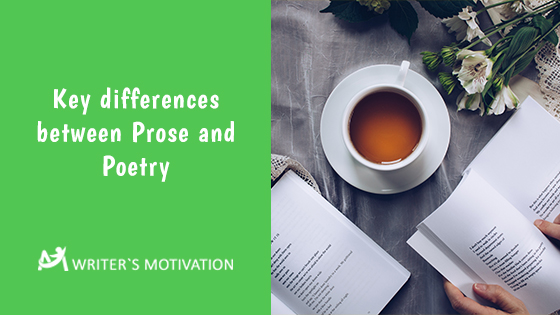Key differences between Prose and Poetry

If you are just starting out as a writer, it is important that you know the key differences between some writing terms. Of the writing terms, there are two that most writers tend to get mixed up. These are prose and poetry. Some writers even use them interchangeably.
This could be an embarrassing mistake for most writers once they get started in their writing careers. To spare you this potential mistake and embarrassment, let’s delve into the differences between prose and poetry.
Here are the key differences between prose and poetry.
Prose
In layman’s terms, prose is the actual written work of the writer. It is composed of the sentences and paragraphs, and does not follow any metrical structure. The main intent of the prose is to express the author’s thoughts and ideas in the most straightforward and lucid way possible.
Key traits
-
It is straightforward
A key characteristic of prose is that it is straightforward and the main idea is meant to be shared with as much clarity as possible. There is no need to follow a specific rhyme or rhythm. Instead, prose follows a precise grammatical structure and narrative.
-
It is arranged in paragraphs
The words used in prose are grouped into sentences, and a block of sentences is called a paragraph.
This is quite different to poems, because poems are usually grouped into stanzas, and there is usually a limit to how many verses are in a stanza.
On the other hand, paragraphs are made up of several sentences and follow a grammatical structure and flow of speech.
-
It uses ordinary language
When it comes to the language in a prose, it has to be as ordinary as possible. This means the word play does not have to be flowery or rhythmical. The language must be easy to understand enough, that the reader can understand the contents without having to reread it.
-
Prose has no word limit
A key characteristic of prose is that it does not really have a word limit. You can break your paragraphs into groups. However, you could just keep writing and not really heed the number of words you use. Be careful, though. If you make your paragraphs too blocky, your readers may have a hard time reading the content. This is why you should still take heed of the number of sentences in your paragraphs. You should also utilize punctuation marks effectively.
Poetry
Poetry’s primary goal is to provide readers with an experience. It is artistic in nature, and the words are selected and arranged to convey a specific emotion and imagery. They follow a specific rhythm and rhyme. Their words are arranged into lines, and multiple lines make up a stanza.
Key Traits
-
It is expressive in nature
The main purpose of a poem is to express a specific feeling and aesthetic to the reader. While prose is meant to inform readers, a poem is meant to entertain them. Thus, poetry does not need to be straightforward. Instead, the words in a poem must be chosen to express a feeling or aesthetic in the most effective way possible.
-
It utilizes rhythm and rhyme extensively
While prose could be phrased in less flowery writing, poetry usually incorporates rhythm and rhyme into its wordplay. Rhythm is the moment when two or more words share similar ending sounds. Rhythm is the cadence of the poem.
The main intent of a poem is to entertain and convey a specific emotion to readers. The amount of rhythm and rhyme in a poem usually depends on the type of poem being written.
-
The words are arranged in stanzas
The lines in a poem are usually arranged into groups called stanzas. These lines are usually arranged in a recurring pattern and follow a set sequence of rhymes and metrical length.
-
Poetry uses line breaks
Poetry usually uses line breaks to separate stanzas. Poems use line breaks because the white space creates a sense of pause, which helps in controlling the speed and rhythm in which the poem is read.
Conclusion
A common mistake that some newbie writers make early in their writing careers is that they tend to interchange prose and poetry, which is quite a mistake, because the two are very different. With this article, you’ll be able to tell the difference between prose and poetry.
Recommended Posts
GETTING PUBLISHED
WRITING
PUBLISHING
MARKETING






